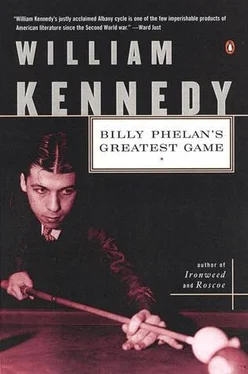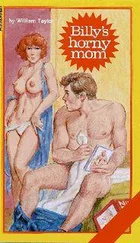Billy got into the boat, one of a dozen rowing around on Broadway, and his father rowed them down the center of the street, down the canyon of buildings, wearing his cap and the heavy knit sweater with the collar that Billy remembers. Never a coat; a sweater and gloves always enough for that man. He rowed Billy half a block and then said: They’ll fix this stuff one of these days.
I don’t want them to fix it, Billy said.
They’ve got to, said his father, because they can’t let this kind of thing go on.
Billy, sitting in the back of the boat like the captain, said, I hope they never fix it. Then they got the trunk and Uncle Peter, who sat with Billy on his lap, and the trunk standing up in the middle of the boat.
A damn shame, Uncle Peter said, to put up with this, but I suppose you like it, young fellow. And Billy said he liked it better than snow. They rowed to the station, where Uncle Peter got his train and went away.
Now 1913 was gone, too, but Billy was again gliding down Broadway in a craft of his own making, and he relished the sight. There was Albany’s river of bright white lights, the lights on in the Famous Lunch, still open, and the dark, smoky reds of Brockley’s and Becker’s neon tubes, and the tubes also shaping the point over the door of the American Hotel, and the window of Louie’s pool room lit up, where somebody was still getting some action, and the light on in the Waldorf restaurant, where the pimps worked out of and where you could get a baked apple right now if you needed one, and the lights of the Cadillac Cafeteria with the pretty great custard pie, and the lights on in the upper rooms of the Cadillac Hotel, where the Greek card game was going on and where Broadway Frances was probably turning a customer upside down and inside out, pretty, tough, busy, knobby lady and Billy’s old friend, and the lights in the stairway to the Monte Carlo, where the action would go on until everybody ran out of money or steam, and the lights, too, in Chief Humphrey’s private detective office, the Chief working late on somebody’s busted marriage, and the light in Joe Mangione’s rooms upstairs over his fruit store, and light in the back of Red’s barbershop coming through a crack in the door, and Billy knew that Red and others were in there playing blackjack. And look there, too, buddy boy: The lights are on in Bill’s Magic Shop, where Bill is staying late, hoping to sell a deck of cards or a pair of dice or a punch board or a magic wand to some nighthawk in search of transport, and the lights are on, too, in Bradt’s drugstore, where Billy does all his cundrum business.
The lights are on because it’s not quite half past eleven on Broadway and some movies are still not out and plenty of people are waiting for the westbound train just now pulling into Union Station, bound for Cleveland and Chicago and carrying the New York papers. Lights are on in Gleason’s Grill, which was a soda fountain before beer came back, and lights are shining in the other direction, up toward Orange Street and Little Harlem, like Broadway but only a block long, with the colored crap and card games going strong now, and the Hotel Taft doing its colored business on white sheets, and Prime and Ginsburg’s candy store still open, with beer by the bottle and a game in the back and people talking politics there, McCall nigger politics, even at this hour, because that is where the power Democrats gather in Little Harlem.
There is Helen’s Lunch, dark now, which feeds the colored hungry and Martha’s colored bar all lit up and full of all-night wild music (Play it, Fatha), where Martha wets down the colored thirsty but not just the colored. Lights burn in the Carterer Mission, where the colored bums get the same treatment and food the white bums get; and in the colored rooming house run by Mrs. Colored O’Mara, where Slopie Dodds has his rooms and where he keeps his crutches when he’s wearing his leg.
There is light still in the triangular sign of the Railroad YMCA, keeping the lamp lit for the conductors and brakemen and engineers who terminate in Albany tonight and want a clean pillow. And next door a light is on in the Public Bath, closed now but where Billy watched his sister, Peg, learn to swim, ducked by Uncle Chick. Peg, older than Billy by eight years, was terrified when she went under. Billy was already a swimmer then, learned in the Basin and in the Hudson when Peg was afraid to go near it. Billy learned everything by himself, everything worth learning. He’d been swimming all that summer when his mother told him to stay away from the river. That August he climbed the Livingston Avenue railroad bridge and dove in — forty feet high, was it? — wearing a straw hat to protect his head. The next summer Billy dove off that trestle without the hat and came up with a fish in his mouth and a mermaid biting his big toe.
Look down Broadway.
Here comes a Pine Hills trolley, and here are the cars coming in to pick up the train people, and there are the Yellow cabs and the gypsies waiting for their long-distance action.
And here comes Mike the Wop ahead of all the passengers, Mike always one of the first off the train because he knows the kids are waiting. Thirty kids anyway. Oughta be in bed, you scurvy little rug-rats. But they know Mike is due.
Mike comes out wearing his candy butcher’s apron full of change. He has no use for change because he is thick with folding money and bound for the action at the Monte Carlo, and after that he may contract for a bit of the old interrelatedness with Broadway Frances or one of her peers, but for now he is the God Almighty Hero of the Albany rug-rats who scream: Here he comes. And of course Mike sees them as soon as he moves across the concourse of the station, the great, glorious, New York Central monument to power, and, feeling perhaps as potent as Vanderbilt, Mike expansively lets his great, pasta-filled stomach precede him toward the door to Broadway.
He then pushes open the station’s storm door and enters onto that segment of Broadway Billy and his friends are just now approaching from the north.
Billy pauses and says, Hey, Mike.
Mike turns and is distracted only momentarily from the performance at hand but does say, Eh, Billy, and turns back then to the rug-rats and spins out the change onto the sidewalk under the canopy: dollar, two, five, ten, twenty. Who knows how much change Mike the Wop strews before the rug-rats of Broadway? He gives, they receive. They scramble and pick it up, take it home, and buy the milk and beer.
A man, a grown man, a bum, a wino, a lost derelict from the sewers and gutters of elsewhere, passes and sees Mike’s generosity and reaches down for a dime.
Get lost, bum, says Mike, and when the bum does not, Mike raises a foot and pushes the bum over, into the street, where he falls and rolls and is almost run over by a Yellow cab just leaving for Loudonville with a customer and four valises, and is also almost decapitated by the Number Four Pine Hills trolley.
The bum rises, walks on, the dime in his grip.
Mike supervises as the rug-rats clean up every visible nickel and penny, sift in the soft dirt of the gutters for dimes that rolled into the glop. And some will be back, scrounging at dawn for coins that eluded everyone last night. Now they take their cache and disentangle themselves from one another. They run, seethe into the night, and evaporate off Broadway.
Billy watches them go, watches, too, as Mike crosses the street to walk beneath the brightest of the bright lights, one of the many maestros of Broadway power, now heading into the center of the garden in search of other earthly delights.
The station was still alive with travelers, with the queers buzzing in and out of the men’s room, and the night crowd hot for the papers. When Billy had bought the Times-Union , found the ad, decoded what they all knew was there to begin with, then Martin said to Morrie: “I saw your father tonight and told him about this.”
Читать дальше












